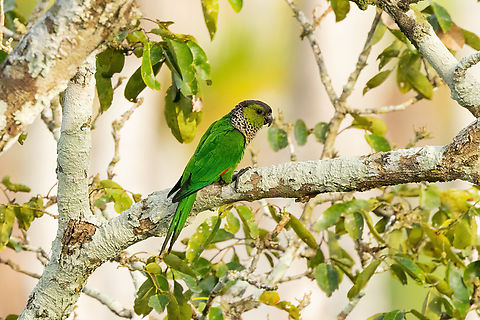
Status
Black capped parakeets are listed as near-threatened in the wild on Appendix II. The primary cause of their habitat loss is the deforestation of the Amazon Basin. It is estimated that between there will be a 13.7% and 15.5% loss of habitable land over 18 years. A decrease in forest buffers alongside streams, amnesty for land owners guilty of illegal deforestation before 2008, and a reduction in the amount of private land that must be kept as forest contribute to this problem.Behavior
Black capped parakeets are highly social birds and communal roosters. In the wild, they flock with up to 30 birds at a time. During breeding season smaller groups of families can be found. Black capped parakeets enjoy bathing. In the wild black capped parakeets are canopy feeders. The black capped parakeet lives up to 30 years in captivity.As highly inquisitive birds, black capped conures require many versatile toys to keep them occupied. Many toys should be obtained and they should be rotated out every few days. Interactive toys such as bird puzzles can entertain a conure and prevent boredom. Black capped conures have an affinity for water and enjoy bathing and dunking their dry food in water. Their water bowl should be changed at least twice a day for this reason. After bathing, black capped conures shiver to build and maintain body heat.Habitat
It lives in humid forests, ranging from the Amazonian lowlands up to an altitude of 1000 m on the east Andean slopes. It is designated as Least Concern despite deforestation in the Amazon Basin. Flock size is up to 30 birds with smaller groups forming during breeding season.Reproduction
Black capped parakeets reach sexual maturity between 1 and 3 years old. They roost in small groups during breeding season. A clutch generally has 4 to 7 eggs. They have a 24-day incubation period, followed by 7 to 8 weeks of parental care. Black capped parakeets have a breeding season from February to March.Black capped parakeets reach sexual maturity between 1 and 3 years old. They roost in small groups during breeding season. A clutch generally has 4 to 7 eggs. They have a 24-day incubation period, followed by 7 to 8 weeks of parental care. Black capped parakeets have a breeding season from February to March.Food
Wild black capped parakeets eat a variety of fruits, nuts, berries, and vegetation. They may also raid farmers crops.A black-capped conure should be fed a healthy mix of fruits, vegetables, and pellets. The pellets should account for about 75% of the bird's diet, while 25% of their diet should be fresh fruit and vegetables. Seeds, nuts, and other treats high in fat should be used as a reward and to supplement the diet. Black-capped conures should be given a wide variety of colorful fruits and vegetables. Light green or white vegetables have little nutritional value. Conures can eat human food, although they cannot eat avocados, chocolate, alcohol, or caffeine. They can eat small amounts of meat and eggs, although they should avoid foods high in fat and salt.Cultural
Known as the black capped conure in aviculture, it is known as the quietest of the conures. If they are bored or left alone for too long they can be loud. They are most active at dawn and dusk. They are sociable birds who require a lot of attention. They may be shy around new people, but its highly inquisitive nature often negates any shyness. To clean themselves and keep their feathers orderly black capped conures preen themselves. They may yawn after this to clear out their nasal passages. Conures enjoy having their head scratched gently by their owners. They may indicate this by bowing their heads or rubbing against a hand.As highly inquisitive birds, black capped conures require many versatile toys to keep them occupied. Many toys should be obtained and they should be rotated out every few days. Interactive toys such as bird puzzles can entertain a conure and prevent boredom. Black capped conures have an affinity for water and enjoy bathing and dunking their dry food in water. Their water bowl should be changed at least twice a day for this reason. After bathing, black capped conures shiver to build and maintain body heat.References:
Some text fragments are auto parsed from Wikipedia.